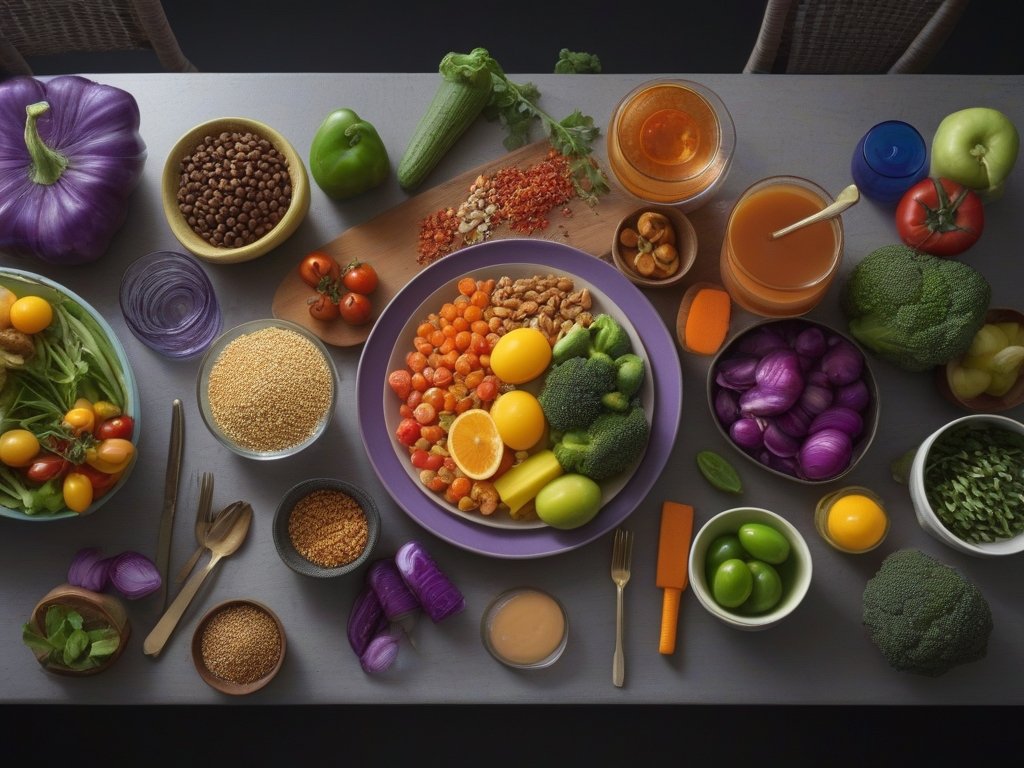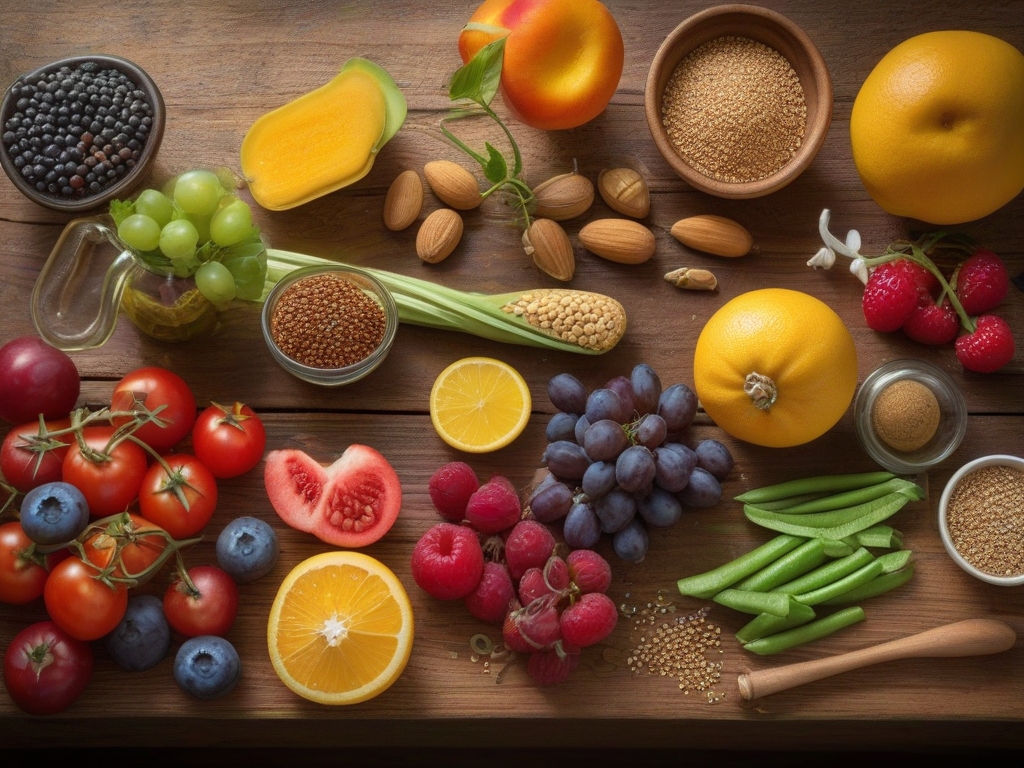What Should a Picky Eater Eat to Lose Weight?
DATE : 13 October 2024 By : Tareq Qteshat

As a picky eater trying to lose weight, I've found that incorporating healthier alternatives to my favorite foods can make a big difference. Swapping traditional pizza for cauliflower crust and burgers for black bean patties can be a life-saver. I also try to mix in roasted vegetables like broccoli and Brussels sprouts, lean proteins like chicken and turkey, and whole grains like quinoa and brown rice. Low-calorie snacks like baby carrots with hummus and air-popped popcorn can curb cravings between meals. By making these small changes and learning more about portion control and meal planning, I can stay on track and reach my weight loss goals.
Table of Contents
ToggleKey Takeaways
- Picky eaters can try healthier alternatives to favorite foods, like cauliflower crust pizza and black bean burgers.
- Incorporating lean proteins like chicken, turkey, fish, and lentils can promote satiety and support overall health.
- Low-calorie snacks like baby carrots with hummus and air-popped popcorn can help prevent overeating.
- Eating smaller, more frequent meals can help manage a picky eater's diet and reduce feelings of overwhelm.
- Mindful eating techniques, such as savoring each bite and identifying emotional triggers, can lead to a healthier relationship with food.
Healthy Alternatives to Favorites

Many of my favorite childhood treats, like pizza, burgers, and mac 'n cheese, are now considered unhealthy staples in my diet. But I've learned it's not necessary to give them up entirely.
Instead, I've found healthy alternatives that satisfy my cravings without sabotaging my weight loss goals. Favorite swaps like cauliflower crust pizza or black bean burgers have become staples in my kitchen.
I've also unearthed cultural alternatives that are both nutritious and delicious. For example, Korean bibimbap bowls, which are packed with vegetables and brown rice, have become a favorite swap for traditional burgers and fries.
Similarly, Indian lentil curries, which are rich in protein and fiber, have replaced my old go-to mac 'n cheese. By incorporating these healthier options into my diet, I've been able to enjoy my favorite foods without feeling guilty or compromising my health.
This approach hasn't only helped me lose weight but also expanded my culinary horizons and introduced me to new flavors and cuisines.
Nutritious Foods to Try
Beyond my favorite swaps, I've found a wide variety of nutritious foods that can be easily incorporated into a healthy diet. I've learned that trying new foods and flavors can be an exciting path, especially when done through mindful exploration.
By keeping a food diary, I've been able to track my food preferences and identify patterns. This process has allowed me to pinpoint which nutrient-dense foods I enjoy and how to incorporate them into my meals. As a picky eater, I've also found that meal planning and exploring different food options, such as How to Eat Healthy When You Are a Very Picky Eater?, can be incredibly beneficial in maintaining a balanced diet. Additionally, considering the best foods for picky eaters, such as Best Food for Picky Eaters, has helped me make informed choices.
I've uncovered a range of nutrient-rich foods that cater to my picky palate, including roasted vegetables like broccoli and Brussels sprouts, lean proteins like chicken and turkey, and whole grains such as quinoa and brown rice. I've also found that I enjoy a variety of fruits, including berries, citrus fruits, and apples.
Low Calorie Food Options

As I focus on low-calorie food options, I find that crucial to bear in mind three key areas: lean protein sources, fresh fruit options, and low-calorie snacks. These options can help picky eaters make healthier choices without feeling overwhelmed by drastic changes to their diets.
Incorporating leafy greens, such as lettuce and kale, into meals can also provide essential nutrients while being low in calories, and growing these greens at home using space-saving techniques can be a cost-effective way to have a constant supply.
Lean Protein Sources
I focus on lean protein sources when planning meals for a picky eater, as they're vital for a balanced diet and can be adapted to suit various tastes. Lean protein sources are rich in nutrients and can be prepared in a variety of ways, making them more appealing to picky eaters.
I recommend incorporating fish recipes into meal plans, such as baked salmon or grilled tilapia, as they're low in calories and high in protein.
Other lean protein sources include poultry, beans, and lentils. These can be incorporated into meals in a variety of ways, such as stir-fries, salads, or soups.
For picky eaters who struggle to get enough protein from whole foods, protein supplements can be a helpful addition to their diet. However, it's crucial to choose a supplement that's low in added sugars and artificial ingredients.
When selecting a protein supplement, I recommend opting for a product that's made from a high-quality protein source, such as whey or pea protein. By incorporating lean protein sources into meal plans, picky eaters can help support their weight loss path while also nourishing their bodies.
A balanced diet with adequate protein can help promote satiety and support overall health.
Fresh Fruits Options
Fresh fruits are a nutritious and low-calorie addition to any diet, making them an ideal option for picky eaters. Not only are they rich in vitamins, minerals, and antioxidants, but they're also versatile and can be easily incorporated into your daily meals.
For instance, I can start my day with a bowl of fresh berries or sliced banana with oatmeal. I also enjoy snacking on apples, oranges, or grapes throughout the day.
If I'm looking for something a bit more exotic, I opt for fruits like mangoes, pineapples, or papayas.
However, I understand that access to fresh fruits can be limited at times. In such cases, I consider alternatives like freeze-dried fruits or canned fruit options.
Freeze-dried fruits are a great option as they retain most of their nutritional value and are lightweight, making them perfect for on-the-go snacks. Canned fruits, on the other hand, are often packed in their own juice, making them a healthier alternative to those packed in syrup.
Low-Calorie Snacks
Picky eaters often have a hard time finding snacks that are both low in calories and enjoyable to eat. As someone who's struggled with this, I've unearthed a few options that can help curb those evening munchies.
Crunchy snacks, in particular, can be very satisfying and are often low in calories. Some of my favorites include baby carrots with hummus, air-popped popcorn, and raw veggies like cucumbers and bell peppers.
If you're craving something a bit more substantial, try opting for low-calorie granola or energy balls made with rolled oats and nuts.
These snacks aren't only crunchy but also packed with fiber and protein to keep you full. Another option is to try low-calorie crackers with avocado or peanut butter spreads.
These snacks aren't only delicious but also provide a good source of healthy fats and protein.
When it comes to evening munchies, I find that having a bowl of low-calorie snacks on hand can help prevent overeating.
Try keeping a bowl of baby carrots or air-popped popcorn on your coffee table to munch on while you watch TV.
Portion Control Is Key
When I'm trying to stick to a healthy diet as a picky eater, I've found that eating smaller meals is essential.
To make this work, I use smaller plates to gauge my food intake and control the amount of food I serve myself.
Eat Smaller Meals
Flexibility is key in managing a picky eater's diet, and eating smaller meals is a simple yet effective approach.
As someone who's struggled with picky eating, I've found that eating smaller meals helps me feel more in control of my food choices and reduces feelings of overwhelm.
Eating smaller meals also allows for more flexible schedules, which is essential for picky eaters who may need time to adjust to new foods or meal times.
By eating smaller meals, I can spread out my meals throughout the day and avoid feeling too full or too hungry.
Three ways eating smaller meals can benefit a picky eater's weight loss path:
- Reduces portion sizes: Smaller meals mean smaller portions, which can help reduce overall calorie intake.
- Increases eating frequency: Eating smaller meals allows for more frequent meals, which can help keep hunger and cravings under control.
- Enhances metabolism: Eating smaller, more frequent meals can help keep metabolism elevated throughout the day, supporting weight loss efforts.
Use Smaller Plates
I've found that shrinking my plate size helps me gauge my food portions more accurately, which is essential for maintaining a balanced diet.
Using smaller plates forces me to be more mindful of the amount of food I eat, reducing the likelihood of overeating. Research supports this approach, suggesting that plate size variations can greatly influence food intake.
When choosing a smaller plate, consider the color. Colorful plates can make mealtime more enjoyable and visually appealing.
Opt for a plate that's 8-10 inches in diameter – this size is ideal for portion control. I've also found that eating from a smaller plate helps me focus on the quality of my food rather than the quantity.
Control Food Amounts
Smaller plates are just one part of the equation – controlling food amounts is key to a balanced diet.
As a picky eater, I've learned that eating less doesn't have to mean sacrificing my favorite foods, but rather finding ways to measure and manage my portions.
To start, I use measuring cups to gauge the right amount of food for each meal.
This simple trick helps me avoid overeating and guarantees I'm getting the nutrients I need.
I also keep a food journal to track my daily intake and identify patterns in my eating habits.
- Eat until satisfied, not stuffed: I stop eating when I feel satisfied, rather than waiting until I'm full. This helps me avoid overeating and reduces the likelihood of weight gain.
- Use a food scale: A food scale helps me accurately measure my food portions, certifying I'm eating the right amount for my body's needs.
- Avoid distractions while eating: Eating in front of the TV or computer can lead to mindless snacking and overeating. I make sure to eat in a distraction-free environment to stay focused on my food and control my portions.
Meal Planning Made Easy

Meal planning can be a challenging task, especially when you're dealing with a picky eater. However, I've found that with the right tools and strategies, it can be made easier. One of the most effective ways to plan meals is to use a structured eating schedule. This involves setting a specific eating schedule and sticking to it, including three main meals and potentially one or two smaller meals in between.
To make meal planning even easier, I've put together a table of meal planning tools that you can use to plan your meals:
| Meal Planning Tool | Description |
|---|---|
| Meal planning apps | Apps like MyFitnessPal and Lose It! allow you to plan and track your meals. |
| Meal planning templates | Templates can be found online and printed out to help you plan your meals. |
| Grocery list apps | Apps like Out of Milk and Grocery IQ allow you to make grocery lists and keep track of what you need to buy. |
| Recipe websites | Websites like Allrecipes and Epicurious provide a wide range of recipes to choose from. |
| Meal planning books | Books like "The Meal Planner" provide guidance on how to plan healthy meals.
Snacking for Weight Loss
When it comes to losing weight, snacking plays a more significant role than you might think.
As a picky eater, I've learned that choosing the right snacks can help me reach my weight loss goals. Mid morning snacks are vital in preventing overeating during lunch, while evening treats can curb the urge to indulge in unhealthy foods before bed.
Incorporating a trellis into your garden or indoor space can also promote healthy eating by providing support for climbing plants, allowing them to grow vertically and maximizing vertical growth.
By choosing snacks that are high in fiber and protein, you can also reduce the risk of pest and disease in your diet.
- Fresh Fruit and Nuts: Combine your favorite fruits with a handful of nuts for a satisfying snack that's high in fiber and protein.
- Protein-Rich Yogurt: Choose a plain, low-fat yogurt and add your favorite toppings, such as berries or honey, for a snack that's both healthy and delicious.
- Veggie Sticks with Hummus: Dip raw or roasted veggie sticks in a protein-rich hummus for a snack that's both healthy and filling.
Eating Mindfully Matters

I've found that healthy snacking sets the stage for a mindful approach to eating – one that extends far beyond the snacks themselves.
When I eat mindfully, I'm more attuned to my body's hunger and fullness cues, making it easier to stop when I've had enough. This, in turn, helps me develop a healthier relationship with food.
Mindful techniques can be applied to any meal or snack. One approach is to savor each bite, paying attention to the flavors, textures, and aromas.
This can help slow down eating and reduce overconsumption. Another technique is to identify and challenge emotional triggers that lead to overeating.
For example, if I notice that I always reach for snacks when I'm stressed, I can try alternative coping mechanisms, such as taking a short walk or practicing deep breathing exercises.
Overcoming Food Aversions
- Start small: Begin by simply looking at the food, then progress to smelling it, and eventually take a small taste.
- Pair with familiar foods: Combine the new food with something you already enjoy, making the experience more comfortable and enjoyable.
- Make it positive: Reward yourself after trying a new food, and focus on the positive aspects of the experience, rather than the anxiety or discomfort.
Frequently Asked Questions
Can Picky Eaters Follow a Keto Diet for Weight Loss?
As someone trying keto for weight loss, I find it challenging, but doable. I look for keto recipes that I enjoy and stick to meal planning to guarantee I'm getting the right nutrients.
How Does Stress Affect a Picky Eater's Weight Loss?
I recall a friend who binged on comfort foods when stressed, exemplifying how chronic anxiety can trigger emotional eating. As a picky eater, acknowledging these emotional triggers is vital to breaking the weight loss barrier.
Is It Healthy to Skip Meals as a Picky Eater?
As a picky eater, I've learned skipping meals can lead to nutrient deficiencies and slowed metabolism. Instead, I opt for meal skipping alternatives, such as healthy snacking or portion-controlled meals, to avoid picky eating consequences.
Can Picky Eaters Benefit From Intermittent Fasting?
As I examine picky eaters' benefits from intermittent fasting, I find it offers flexibility in eating windows, allowing for more control over food choices, which can lead to healthier habits and weight management.
Do Certain Medications Affect Weight Loss in Picky Eaters?
One in five people take medications that can impact weight loss. I've learned that certain meds can affect hormone levels, influencing hunger and fullness cues, while others have side effects that slow metabolism, hindering progress.
Conclusion
I know what you're thinking – "I'll never be able to stick to a diet with all the foods I dislike." But don't let that hold you back. By incorporating healthy alternatives to your favorite foods, trying new nutritious options, and practicing portion control, you can lose weight without sacrificing flavor. It's not about depriving yourself, but about making sustainable lifestyle changes that you can maintain in the long run.










